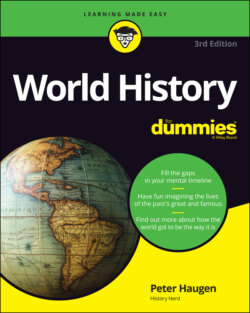Читать книгу World History For Dummies - Peter Haugen - Страница 78
Leaving a legacy
ОглавлениеAlexander’s clout didn’t die with him. Legend says that his body was preserved in honey while his followers spent more than two years building an ornate funeral wagon. When the wagon was ready, mourners loaded the imperial casket onto it and began a ponderous, 1,500-mile funeral procession to Macedon for burial. They never got there. Alexander’s General Ptolemy, appointed governor of Egypt, diverted the procession to Alexandria, one of the cities the conqueror had named for himself. There, the possession of Alexander’s corpse gave Ptolemy the status to become ruler in his own right. He founded Egypt’s Ptolemaic Dynasty, which continued until his descendant Cleopatra VII died in 30 BC.
One of Alexander’s enduring achievements is that he spread the infectious Greek way of questioning and thinking about the world. He and his largely-Greek forces disseminated Greek attitudes. Alexandria, Egypt, became a center of Hellenistic culture, meaning that Greek-influenced ideas and language networked beyond the widespread Greek city-states and lasted into much later eras.
Rationality, democracy, individualism, citizenship, free debate, and the inquiry born of Greek-style philosophy percolated through other cultures. Some anthropologists, and some historians too, like to call this “cultural diffusion” or “trans-cultural diffusion.” Those terms just mean that ideas — including philosophy, but including technology, cuisine, and fashion — migrate to new places as diverse groups of people come into contact with each other. After Alexander, philosophy became a cornerstone of science, and the scientific approach became a primary tool for interpreting reality. In that way, the Classical Greeks still exert a powerful influence.
